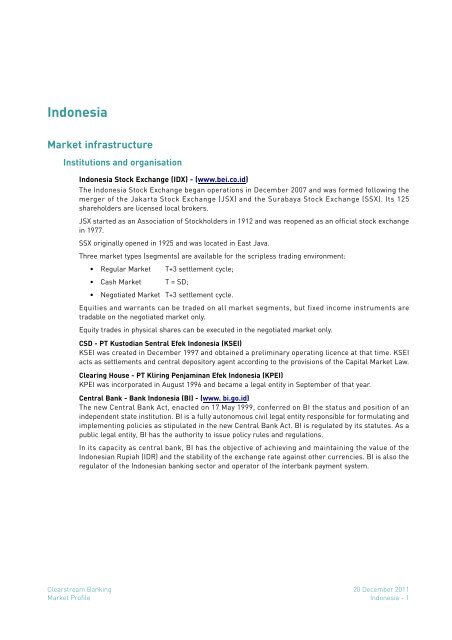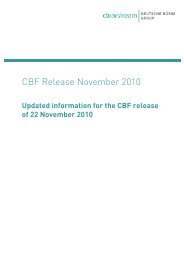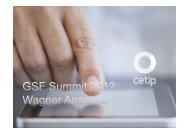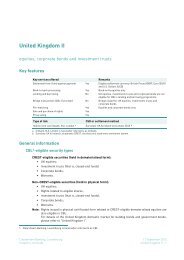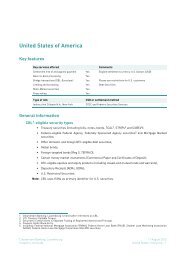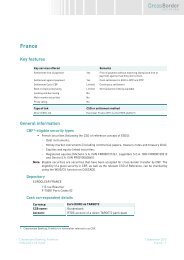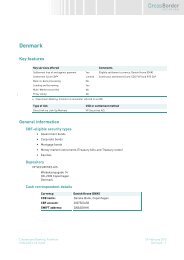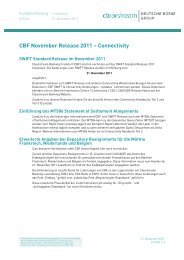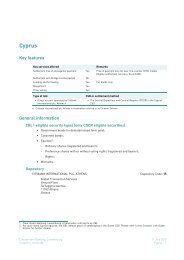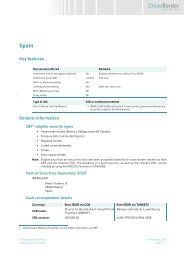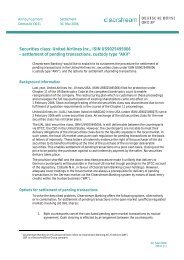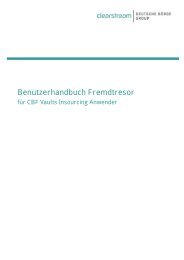Indonesia - Clearstream
Indonesia - Clearstream
Indonesia - Clearstream
Create successful ePaper yourself
Turn your PDF publications into a flip-book with our unique Google optimized e-Paper software.
<strong>Indonesia</strong><br />
Market infrastructure<br />
Institutions and organisation<br />
<strong>Indonesia</strong> Stock Exchange (IDX) - (www.bei.co.id)<br />
The <strong>Indonesia</strong> Stock Exchange began operations in December 2007 and was formed following the<br />
merger of the Jakarta Stock Exchange (JSX) and the Surabaya Stock Exchange (SSX). Its 125<br />
shareholders are licensed local brokers.<br />
JSX started as an Association of Stockholders in 1912 and was reopened as an official stock exchange<br />
in 1977.<br />
SSX originally opened in 1925 and was located in East Java.<br />
Three market types (segments) are available for the scripless trading environment:<br />
• Regular Market T+3 settlement cycle;<br />
• Cash Market T = SD;<br />
• Negotiated Market T+3 settlement cycle.<br />
Equities and warrants can be traded on all market segments, but fixed income instruments are<br />
tradable on the negotiated market only.<br />
Equity trades in physical shares can be executed in the negotiated market only.<br />
CSD - PT Kustodian Sentral Efek <strong>Indonesia</strong> (KSEI)<br />
KSEI was created in December 1997 and obtained a preliminary operating licence at that time. KSEI<br />
acts as settlements and central depository agent according to the provisions of the Capital Market Law.<br />
Clearing House - PT Kliring Penjaminan Efek <strong>Indonesia</strong> (KPEI)<br />
KPEI was incorporated in August 1996 and became a legal entity in September of that year.<br />
Central Bank - Bank <strong>Indonesia</strong> (BI) - (www. bi.go.id)<br />
The new Central Bank Act, enacted on 17 May 1999, conferred on BI the status and position of an<br />
independent state institution. BI is a fully autonomous civil legal entity responsible for formulating and<br />
implementing policies as stipulated in the new Central Bank Act. BI is regulated by its statutes. As a<br />
public legal entity, BI has the authority to issue policy rules and regulations.<br />
In its capacity as central bank, BI has the objective of achieving and maintaining the value of the<br />
<strong>Indonesia</strong>n Rupiah (IDR) and the stability of the exchange rate against other currencies. BI is also the<br />
regulator of the <strong>Indonesia</strong>n banking sector and operator of the interbank payment system.<br />
<strong>Clearstream</strong> Banking<br />
20 December 2011<br />
Market Profile <strong>Indonesia</strong> - 1
Market Profile<br />
Regulatory structure<br />
The responsibilities of the regulatory bodies are as follows:<br />
• Ministry of Finance<br />
The Ministry of Finance has the ultimate responsibility for regulating the JSX through BAPEPAM.<br />
• Capital Market and Financial Institution Supervisory Agency (Badan Pengawas Pasar Model dan<br />
Lembaga Keuangan - BAPEPAM-LK)<br />
BAPEPAM-LK is the government agency under the Ministry of Finance, supervising the capital<br />
market and non-bank financial institutions, such as insurance and pension funds. It previously<br />
had dual roles serving as both executor and supervisory board but currently focuses its activities<br />
solely on supervisory and regulatory issues. BAPEPAM-LK regulates and monitors all issues<br />
relating to equity securities and corporate bonds, which are publicly offered or listed in<br />
<strong>Indonesia</strong>, including the offering and allocation procedure for Initial Public Offerings (IPOs).<br />
• Central Bank (Bank <strong>Indonesia</strong> - BI)<br />
BI, an independent body reporting directly to the House of Representatives, is responsible for the<br />
following:<br />
- achieving and maintaining stabilty of the Rupiah (IDR);<br />
- formulating and implementing monetary policy;<br />
- regulating and ensuring a smooth payment system;<br />
- supervising the national banking system.<br />
• Financial Services Authority (Otoritas Jasa Keuangan - OJK)<br />
On 27 October 2011, the <strong>Indonesia</strong>n Parliament approved the establishment of the OJK. This new<br />
authoritative body, which would be an integration of some of the functions of the BAPEPAM-LK<br />
and BI, will have full capital market and banking supervisory functions and will govern the<br />
insurance, pension fund and other financial services industries.<br />
The expected completion of the integration of the functions of the BAPEPAM-LK with the OJK is<br />
expected to be completed by 31 December 2012 and that of the banking supervisory functions of<br />
the BI with the OJK is expected to be completed by the end of 2013.<br />
• PT Bursa Efek Jakarta (BEJ)<br />
The BEJ, a private company that took over the day-to-day administration of the JSX in 1992,<br />
monitors trading, settlement and the compliance of market participants with JSX regulations.<br />
20 December 2011<br />
<strong>Clearstream</strong> Banking<br />
<strong>Indonesia</strong> - 2 Market Profile
Investment regulation<br />
Holding restrictions<br />
Foreign<br />
shareholding in<br />
<strong>Indonesia</strong>n<br />
companies<br />
Disclosure requirements<br />
Threshold Requirement<br />
None, except in relation<br />
to banking, broadcasting<br />
and financing companies<br />
Buy-Out tenders For all listed securities<br />
except for shares in<br />
banking entities which<br />
are subject to final<br />
approval from BI<br />
<strong>Indonesia</strong><br />
Banks:<br />
Banks may only list up to 99% of their share capital, the remaining 1%<br />
must be owned by resident <strong>Indonesia</strong>n investors.<br />
Broadcasting companies:<br />
Broadcasting Law # 32/2002 paragraph 17 states that foreign investors<br />
cannot invest in private broadcasting companies unless for additional<br />
capital (issuance of new shares) and with a maximum of only 20% out of<br />
the total capital and consisting of at least 2 investors.<br />
Financing companies:<br />
For financing companies the Foreign Ownership Limit is 85% of the paid-up<br />
capital.<br />
Once an investor holds 25% or more of the total outstanding shares<br />
(known as a "controlling shareholding") in a listed company, it is obliged<br />
to disclose whether there is an intention to complete a full takeover of the<br />
listed company. If there is such an intention, a tender offer process to<br />
acquire the remaining shares must be conducted. A tender offer is not<br />
required if the Controlling Shareholder can prove that there is no<br />
intention to execute a full takeover. BI approval is required by investors<br />
intending to exceed a 25% holding of shares issued by a bank.<br />
For details of the local domestic disclosure requirements, please refer to the <strong>Clearstream</strong> Banking<br />
Guide to Disclosure Requirements, which is an appendix to the Creation Market Guide.<br />
<strong>Clearstream</strong> Banking<br />
1 October 2008<br />
Market Profile <strong>Indonesia</strong> - 3
Market Profile<br />
Securities trading<br />
Key market-tradable securities<br />
Trading platforms<br />
Denomination<br />
currency<br />
Maturity<br />
profile<br />
Interest<br />
rate<br />
Interest/Dividend<br />
payment frequency<br />
Place of<br />
settlement<br />
Jakarta Stock Exchange Automated Trading System (JATS)<br />
JATS has been retained by the IDX following the merger between the Jakarta and Surabaya Stock<br />
Exchanges. It facilitates order input and provides opening price information and order matching and<br />
trade confirmation. Orders are matched first by price priority and then by time priority. Upon execution<br />
of a trade, JATS generates a trade confirmation online.<br />
Board lots and odd lots<br />
Board lots (of 500 shares) are traded in the regular market. Depending on the tradable lot, amounts<br />
with denominations less than 500 shares may also be traded in the regular market as long as they total<br />
lots of 500 shares.<br />
Lots of less than 500 shares are otherwise traded in the odd-lot market. BAPEPAM has appointed oddlot<br />
dealers, each handling three to five listed stocks. Prices in the odd-lot market are based on those<br />
prevailing in the regular market but carry a premium of around 7%. Brokerage commission is not<br />
applicable to these transactions.<br />
Block trades are permitted for transactions with a minimum quantity of 20,000 shares. Prices are based<br />
on rates in the regular market.<br />
20 December 2011<br />
<strong>Clearstream</strong> Banking<br />
<strong>Indonesia</strong> - 4 Market Profile<br />
Form<br />
Commercial Paper IDR Various Discount Various KSEI Physical /<br />
book-entry<br />
Corporate bonds<br />
Ordinary shares /<br />
Preference shares<br />
IDR Various Fixed rate,<br />
floating<br />
Treasury bills IDR 1 Month,<br />
3 Months<br />
Various KSEI Physical /<br />
book-entry<br />
IDR - - - KSEI Book-entry<br />
Various Discount BI Book-entry<br />
Treasury bonds IDR upcoming Upcoming Upcoming BI Book-entry<br />
Sertifikat Bank<br />
<strong>Indonesia</strong> (SBI) a<br />
Exchange Traded<br />
Funds<br />
IDR 1,3,6,9,12<br />
Month<br />
Various - BI Book-entry<br />
IDR - - - KSEI Book-entry<br />
Warrants IDR Various - - KSEI Book-entry<br />
a. These securities are money market instruments that exist in both traditional and sharia compliant forms.
Settlement process<br />
Settlement cycles<br />
Equities (scripless): T+3<br />
Fixed income securities (scripless): Negotiable between buyer and seller, usually T+2 or T+3<br />
Settlement flow<br />
<strong>Indonesia</strong><br />
Equities and corporate bonds<br />
Settlement at the KSEI’s Book-Entry Settlement System (C-BEST) is conducted on a real-time basis,<br />
provided that instructions are matched and sufficient funds and/or securities are available.<br />
Although same-day turnaround of instructions is an accepted practice, it is not currently possible to link<br />
the two legs of the transaction in C-BEST and as a consequence, settlement of these types of<br />
transaction may require the additional support of local custodians.<br />
KSEI has appointed four payment banks to assist in their cash settlements. A realignment process,<br />
implemented between the payment banks and run three times a day, “squares off” cash positions<br />
between the payment banks but is not transparent to KSEI participants.<br />
T+0: Trades are executed on the JSX and trade confirmations are sent to the investors.<br />
T+1 - T+2: Settlement instructions are sent to the custodian for pre-matching. Prematching<br />
is conducted on a 'manual' basis between custodians and is not<br />
binding. The selling broker also contacts the seller’s custodian to pre-match the<br />
transaction.<br />
T+2: For receipt against payment transactions, the buyer must have funds available in<br />
their account with the custodian to ensure that cash can be transferred to the<br />
payment bank on the morning of T+3.<br />
T+3: The buying broker delivers the shares to the buyer’s custodian bank. The selling<br />
broker receives the shares from the seller’s custodian bank. For against payment<br />
trades, cash settlement takes place on a net basis at one of four Payment Banks<br />
and securities settlement takes place in C-BEST at the KSEI. Cash is transferred<br />
between custodian and KSEI Nostro accounts at the Payment Banks via BI's<br />
RTGS system. The transfer of securities and then cash for against payment<br />
transactions is completed by 12:00 for on-exchange trades and by 15:00 for offexchange<br />
trades. Confirmation of settlement is sent when the trades are<br />
confirmed as settled by KSEI and subsequently settled in the custodian’s system.<br />
Government bonds<br />
Settlement at the BI Scripless Securities Settlement System (BI-SSSS) is conducted on a real-time<br />
basis.<br />
T+0: Trade is executed.<br />
SD-1: Sub-registry receives instructions and these are pre-matched with the<br />
counterparty.<br />
SD: Sub-registry inputs trade instructions into BI-SSSS for matching and settlement.<br />
BI-SSSS checks availability of cash and securities. When matched, securities and<br />
then cash are transferred immediately on a real-time gross settlement basis.<br />
While securities are settled via BI-SSSS, payments are effected in BI-RTGS<br />
system via payment from the buyer’s to the seller’s sub-registry demand deposit<br />
account with BI. BI-SSSS and BI-RTGS are electronically linked.<br />
<strong>Clearstream</strong> Banking<br />
20 December 2011<br />
Market Profile <strong>Indonesia</strong> - 5
Market Profile<br />
Cash settlement<br />
Cash management<br />
Payments in IDR and foreign currencies are restricted.<br />
Non-resident investors are not permitted to hold overdrafts on their IDR cash accounts in <strong>Indonesia</strong>.<br />
The rules for cash and foreign exchange transactions are as follows:<br />
Parties to transfer Transfer<br />
allowed?<br />
Exceptions<br />
Resident to resident Yes Unless the resident account is with an offshore bank.<br />
Non-resident to resident Yes Unless the resident account is with an offshore bank.<br />
Resident to non-resident No Unless:<br />
• To settle foreign exchange transactions with an onshore bank for the<br />
non-resident’s account with an onshore bank (subject to restrictions<br />
on derivative transactions);<br />
• To settle IDR transfers to a non-resident account with an onshore<br />
bank related to underlying economic activities in <strong>Indonesia</strong> a .<br />
Non-resident to non-resident b<br />
No Unless:<br />
• Between two onshore accounts (not necessarily at the same onshore<br />
bank) of the same non-resident entity;<br />
• To settle IDR transfers between non-resident accounts with onshore<br />
banks related to underlying economic activities in <strong>Indonesia</strong> c .<br />
• To settle foreign exchange transactions with an onshore bank for a<br />
non-resident account with an onshore bank.<br />
a. See “Economic activities for which resident to non-resident transfer of IDR is allowed” on page 6.<br />
b. See “Economic activities for which non-resident to non-resident transfer of IDR is allowed” on page 6.<br />
c. See “Documentary proof required for non-resident to non-resident transfer of IDR” on page 7.<br />
Economic activities for which resident to non-resident transfer of IDR is allowed<br />
• Payments related to direct participation in investments in <strong>Indonesia</strong>;<br />
• Payments related to trades in IDR securities/valuable papers issued by an <strong>Indonesia</strong>n entity;<br />
• Payments related to offshore borrowings in IDR including debt restructuring;<br />
• Opening of import letter of credit in IDR with an onshore bank;<br />
• Opening of local letter of credit;<br />
• Purchasing of goods and service in <strong>Indonesia</strong>;<br />
• Cost of living for foreigners in <strong>Indonesia</strong>.<br />
Economic activities for which non-resident to non-resident transfer of IDR is allowed<br />
• Payments related to acquisition of a direct investment in <strong>Indonesia</strong>;<br />
• Payments related to the trades in IDR securities/valuable papers issued by an <strong>Indonesia</strong>n entity;<br />
• Purchasing of goods and services in <strong>Indonesia</strong>;<br />
• Cost of living for foreigners in <strong>Indonesia</strong>.<br />
20 December 2011<br />
<strong>Clearstream</strong> Banking<br />
<strong>Indonesia</strong> - 6 Market Profile
<strong>Indonesia</strong><br />
Documentary proof required for non-resident to non-resident transfer of IDR<br />
• For transactions of value less than or equal to IDR 500 million, no documentation is required but<br />
a declaration or other information about the type of underlying transactions must be supplied.<br />
• For transactions of values greater than IDR 500 million, the following documentation is required:<br />
- Dividend payment: a copy of the results from the shareholders’ meeting;<br />
- Direct investment: copy of the sales/purchase contract.<br />
• For sale/purchase of securities, a copy of the sale/purchase confirmation1 of the broker or any<br />
authorised party is required.<br />
• For dividend / coupon payments, the following documentation is required:<br />
- Dividend payment: a copy of the dividend payment confirmation from the issuing company;<br />
- Interest payment: a copy of the payment notification from the security issuer.<br />
Foreign exchange restrictions<br />
The IDR is a managed floating currency for which the central bank intervenes to stabilise the exchange<br />
rate against the USD. The central bank quotes the USD buy and sell rates on a daily basis.<br />
Foreign exchange controls require custodian banks report as follows, according to the size of the<br />
transaction:<br />
• Transactions of USD 10,000 or over: daily inward and outward remittance transactions by<br />
customers in IDR and foreign currency and local transactions in foreign currencies between local<br />
residents.<br />
• Transactions below USD 10,000: lump sum of movements.<br />
Foreign exchange transactions prohibited for banks<br />
• Extending credit in IDR or foreign currencies unless through certain retail consumer loans;<br />
• Granting overdraft facilities, including temporary overdrafts and intraday overdrafts;<br />
• Placing IDR with non-residents, including any IDR transfers to offshore banks;<br />
• Purchasing securities in IDR issued by non-residents;<br />
• Inter-office transactions in IDR;<br />
• Equity participation in IDR with non-residents.<br />
1. Against payment settlement instructions are considered to be supporting documents.<br />
<strong>Clearstream</strong> Banking<br />
20 December 2011<br />
Market Profile <strong>Indonesia</strong> - 7
Market Profile<br />
Summary of foreign exchange regulations<br />
FX transaction type Regulation<br />
Outright Buy, value today, TOM Underlying documentation is required, like a buy /receive against payment settlement<br />
and Spot<br />
instruction via SWIFT, tested telex, tested fax or Reuters Monitor Dealing System.<br />
Forward Value and Swap • Minimum term is 3 months, but no longer then the time frame of the investment (no<br />
overnight Swaps);<br />
• Underlying documentation is required, like buy/receive against payment settlement<br />
instructions via SWIFT, tested telex, tested fax or Reuters Monitor Dealing System.<br />
Outright Sell/Delivery against • The regulation does not govern the sale of IDR against foreign currencies for value<br />
payment<br />
today, tomorrow and spot. These transactions can be executed without supporting<br />
documentation of the underlying transactions.<br />
Even though the sale of IDR spot is not restricted, it must be proved that the source of<br />
funds is an economic activity, for example, settlement of a delivery against payment<br />
instruction.<br />
According to market practice, the sale of IDR is held off until settlement of the related<br />
delivery against payment instruction. This is to avoid a situation where the transaction<br />
fails and no more supporting documentation is available to cover the FX trade.<br />
• The regulation does not impose any restrictions on repatriation of cumulated IDR<br />
balances in non-resident accounts.<br />
Derivative Maximum USD 1 million per bank.<br />
SBI (Sertifikat BI) as underlying Not allowed.<br />
transaction to book Forward<br />
Value and Swap<br />
Penalty 10% of threshold breached.<br />
IDR transfers under<br />
Declaration of underlying transaction is required (for example, related securities<br />
IDR 500 million<br />
settlement instruction).<br />
Payment systems<br />
• National payment system (SPN)<br />
BI operates the SPN for the electronic real-time transfer of cash funds in <strong>Indonesia</strong> on a gross<br />
basis. The system is open to banks, non-bank financial institutions, other entities that transfer<br />
funds and switching1 companies. To access SPN, members are required to maintain accounts at<br />
BI.<br />
The SPN (RTGS) system is open daily from Monday to Friday between 06:30 and 16:30.<br />
Cash payments may only be made if funds exist on the payer's account at the central bank.<br />
Payments are considered final and irreversible upon the book-entry crediting of the receiver’s<br />
account. Back value payments are not possible via the SPN (RTGS) system.<br />
• Bank <strong>Indonesia</strong> National Clearing System (SKN)<br />
The SKN is a paperless clearing system used to clear funds transfers for amounts up to IDR<br />
100 Million. Under the SKN, same-day transfers can be executed through the issuance of a<br />
physical credit note for interbank payments and via check for payments between bank to nonbank<br />
entities.<br />
1. Switching is the process of liquidating a position in exchange for other securities with better prospects for growth, yields or capital<br />
gains.<br />
20 December 2011<br />
<strong>Clearstream</strong> Banking<br />
<strong>Indonesia</strong> - 8 Market Profile
Registration<br />
Fixed income securities<br />
Most bonds are bearer instruments and registration is not required.<br />
<strong>Indonesia</strong><br />
Equities<br />
Registration is done automatically by crediting the book-entry/scripless securities to the KSEI account.<br />
The account holder is considered to be the registered owner.<br />
Physical securities are registered upon receipt of the investor’s instruction or a standing instruction.<br />
Certificates must be endorsed under the investor’s name before registration. The registration process<br />
may take up to 14 business days depending on the number of certificates; during the corporate action<br />
peak season, this period may be longer.<br />
Neither a central registrar nor the nominee concept are recognised in <strong>Indonesia</strong>. Physical shares are<br />
registered with each individual issuer and the appointed registrar.<br />
Account structure at KSEI<br />
The central depository (KSEI) requires direct participants (custodian banks, brokers) to open stock<br />
accounts for their clients. Such accounts are on account level (that is, <strong>Clearstream</strong> Banking) and not on<br />
final beneficiary basis. Clients may open a sub-account showing the name of the final beneficiary in<br />
order to benefit from any Double Taxation Treaty agreement.<br />
In the event of KSEI bankruptcy, the assets under custody are considered to be third-party’s assets and<br />
as such will not be included in KSEI’s own assets but will be distributed as per the KSEI’s records.<br />
Account structure at BI<br />
BI, as the central registry, will only deal with banks (for proprietary holdings) and with sub-registries -<br />
that is, custodians - (for third-party holdings).<br />
Each sub-registry maintains an omnibus account and a single cash account at BI to facilitate settlement<br />
of government bonds (GDS) and BI certificates (SBI) and, in turn, investors must open accounts with the<br />
sub-registries. The accounts at sub-registry level should reflect the owner of the GDS and SBI (that is,<br />
client’s name “for and behalf of” the owner).<br />
Stamp duty<br />
Stamp duty is not applicable in the <strong>Indonesia</strong>n market.<br />
Penalties (buy-ins etc.)<br />
All stock exchange trades must settle on T+3. If any shortage of securities is not covered by T+3, KPEI<br />
will impose a penalty called the “Alternate Cash Settlement” (ACS).<br />
ACS is 125% of the highest market value between T+0 and T+3. If the broker does not have sufficient<br />
cash to pay the penalty, KPEI will use the guarantee fund to cover the short cash position and substitute<br />
the relevant buying broker. The selling broker will be suspended for the day pending investigation by the<br />
JSX.<br />
Brokers that are aware of insufficient securities on T+3 have the option to buy them from the cash<br />
market (T+0 settlement cycle) or via the Securities Borrowing programme. KPEI will net off the broker’s<br />
position as of SD from the cash market and the regular market.<br />
Buying brokers with insufficient cash on T+3 will be suspended and KPEI will use the guarantee fund to<br />
cover the obligations. Before suspending the broker, KPEI checks whether the broker has other<br />
collateral, including offline collateral such as time deposits or bank guarantees pledged to KPEI.<br />
<strong>Clearstream</strong> Banking<br />
20 December 2011<br />
Market Profile <strong>Indonesia</strong> - 9
Market Profile<br />
Securities administration<br />
Income collection<br />
Fixed income securities<br />
Interest is paid on most debentures on a quarterly basis.<br />
Equities<br />
Dividends are paid annually in cash or securities. The peak season is May to September.<br />
Corporate actions<br />
Corporate action announcements are usually made by the company or by JSX a few days after the AGM.<br />
Most common corporate events<br />
The most common corporate actions in the <strong>Indonesia</strong>n market are cash and stock dividends, rights<br />
issues (tradable and non-tradable), AGM/EGM and bonus issues.<br />
Proxy voting<br />
All registered investors, local and foreign, can vote. Votes can be exercised either in person or by proxy.<br />
Market compensation rules<br />
Taxation<br />
Fixed income securities<br />
Equities<br />
Books Close date a<br />
Corporate debt instruments KSEI notifies the issuers on the<br />
list of entitled holders<br />
4 days prior to Payment date.<br />
Equities b, Warrants, Unit<br />
trusts<br />
KSEI notifies issuers on the<br />
list of entitled holders<br />
1 day after Record date.<br />
Government bonds BI notifies issuers on the<br />
list of entitled holders as of record<br />
2 days prior to Payment date.<br />
a. The date on which securities positions are fixed and holders are recorded as eligible to receive entitlements.<br />
b. Payment date for dividend payments is generally from 3 to 10 working days after Books Close/Record Date.<br />
Please refer to the <strong>Clearstream</strong> Banking Customer Tax Guide.<br />
Basis for entitlement<br />
Settled position on<br />
books close date.<br />
Settled position on<br />
books close date.<br />
Settled position on<br />
books close date.<br />
Standard interest<br />
calculation rule<br />
360-day basis<br />
Not applicable<br />
360-day basis<br />
Market compensation basis: Settlement date<br />
Automatic Compensation Managed by Local CSD: No<br />
Restriction on custody events/transaction types: No restriction<br />
Additional information: No specific rules for compensation<br />
Service offered by CBL: Adjustment performed based on information received from<br />
the depository.<br />
Market compensation basis: Settlement date<br />
Automatic Compensation Managed by Local CSD: No<br />
Restriction on custody events/transaction types: No restriction<br />
Additional information: No specific rules for compensation<br />
Service offered by CBL: Adjustment performed based on information received from<br />
the depository.<br />
20 December 2011<br />
<strong>Clearstream</strong> Banking<br />
<strong>Indonesia</strong> - 10 Market Profile


